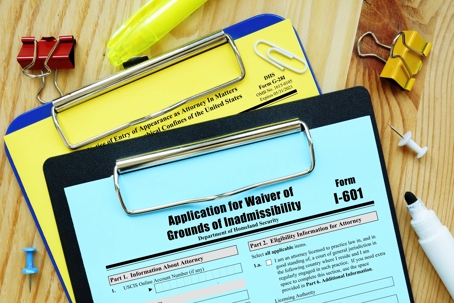To be eligible for entry into the United States, a person seeking to enter must meet the definition of "admissible" under US immigration laws. Failure to satisfy the definition of "admissibility" will be grounds for refusing entry. These are generally called grounds for inadmissibility. The grounds for inadmissibility include
- Ill health
- Criminal convictions and behavior
- Reasons of threats to national security -- often an indication that terrorism is suspected
- Likelihood of becoming a public charge
- Lack of labor certification (for persons seeking entry for non-immigrant work purposes like an H-1B visa)
- Fraud or the making of misrepresentations
- Unlawful presence in the United States
If a person seeking entry has been rejected, the person can seek a waiver of the grounds of admissibility by filing Form I-601. In this article, we will focus on what is required to seek a waiver of the fraud/misrepresentation bar to entry.
What is the Fraud/Misrepresentation Ground for Inadmissibility?
Basically, fraud or a misrepresentation is a lie or untruthful statement or a deceitful scheme or artifice used to evade or violate US immigration laws. If a person is found to have provided fraudulent documents or made a misrepresentation, they are inadmissible to the United States under section 212(a)(6)(c)(i).
For example, assume that a person is seeking a green card based on marriage. Further assume that the person previously entered the United States by using some else’s visa. This is an example of a fraud or misrepresentation that will be grounds for inadmissibility (and denial of the green card application).
What Must be Shown to Obtain a I-601 Waiver?
As noted, a person denied a green card based on fraud or misrepresentation may seek a waiver of that bar to entry by filing for a waiver using Form I-601. What must be shown is that a U.S. citizen or permanent resident will suffer "extreme hardship" if the request for entry is denied.
What is "Extreme Hardship" and How Can it be Proven?
Proving "extreme hardship" to obtain an I-601 waiver is often difficult. It requires presenting significant evidence to the immigration services that a US citizen or a permanent resident will suffer something more than the standard hardship that occurs simply because entry was or is denied. Thus, it is NOT enough that there might be an adverse economic impact from the denial of entry. The adverse economic impact must be extreme. The immigration services provide a very long and detailed explanation of "extreme hardship" here. As can be seen, "extreme hardship" is evaluated on a case-by-case basis and many facts are considered when evaluating the impact of non-admission including:
- Impacts on family ties
- Economic impacts on the qualifying US citizen/resident
- Social and cultural impacts
- Impacts on health conditions and care
- Factors involving the country of origin
As described, the immigration services consider some facts to be "particularly significant" and, when present, indicate that "extreme hardship" should be found. As an example, if the qualifying relative was previously granted Iraqi or Afghan special immigrant status, that fact often weighs heavily in support of finding extreme hardship.
Contact Yekrangi & Associates Today
For more information, contact the Orange County Immigration Attorneys at Yekrangi & Associates today. You are not alone and we will fight for you. Yekrangi & Associates works to meet a higher standard. Our first goal is your satisfaction. Contact us at (949) 478-4963 to schedule a consultation or complete our convenient “Get Your Consultation” form here. We are located in Irvine, California.

